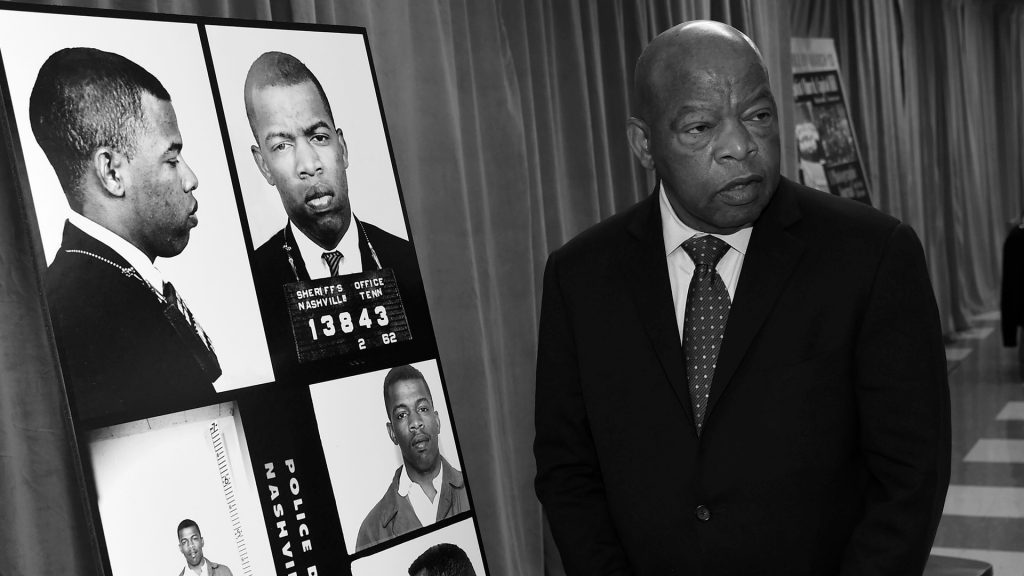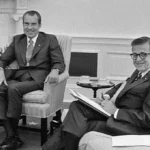Blog Post
How should pro-lifers remember John Lewis?
By Jonathon Van Maren
Civil Rights icon and Congressman John Lewis died of cancer last week at the age of 80, and his storied life and career are being hailed on all sides. Lewis, however, was a devoted man of the Left and a committed advocate of legal abortion. What should pro-lifers and conservatives make of Lewis’s much-lauded life and career?
Born in Alabama to sharecroppers on February 21, 1940, Lewis joined the Civil Rights movement after hearing the speeches of the Rev. Martin Luther King Jr. on the radio, and almost immediately achieved renown as an extraordinary organizer. He organized sit-ins at lunch counters at Nashville’s Fisk University as a student, joined the Freedom Rides in 1961, and became the Chairman of the Student Nonviolent Coordinating Committee (SNCC) in 1963. That year, he became recognized as one of the Big Six leaders of the Civil Rights movement at the age of only twenty-three years old.
Over the next several years, Lewis was at the forefront of nearly every significant event. He was a keynote speaker at the 1963 March on Washington, and led 600 marchers across the Edmund Pettus Bridge in Selma, Alabama on March 7, 1965. The protestors were attacked and brutally beaten by state troopers, and gruesome images of the savagery that were beamed around the country have been credited with shifting public opinion on segregation and contributing to the passage of the Voting Rights Act of 1965. Lewis left the SNCC in 1966, but continued to remain involved in the Civil Rights movement in a variety of capacities.
His political career began in 1981, when he was elected to the Atlanta City Council. In November of 1986, Lewis was elected to Congress, and served as the U.S. Representative of Georgia’s Fifth Congressional District until his death. His life has been the subject of multiple biographies, and he received countless awards from national and international bodies as well as numerous honorary degrees. President Barack Obama awarded Lewis the Medal of Freedom, America’s highest civilian honor. To many, if not most, his place in American history seems untouchable.
But for those of us in the pro-life movement, the towering legacy of John Lewis does cast one dark and ugly shadow: His resolute support for abortion. Lewis boasted a 100% voting record from NARAL Pro-Choice America, and he voted consistently to permit any and all types of abortion and to remove any and all barriers to obtaining one. He voted against banning partial-birth abortion, against making it a separate offence to injure a pre-born child during the course of a crime, and against a ban on transporting minors across state lines to get an abortion. Lewis was a Civil Rights champion, but when it came to the human rights of the youngest and most vulnerable members of the human family, he looked away—and joined the side of the oppressors.
So what are those of us who deeply admire Lewis’s Civil Rights record to do with his record in Congress? Can we ignore the fact that a man who did so much to bring justice to America for one group of citizens also voted consistently against bringing justice to others?
I only saw Lewis only once in person, and I will cop to having been a little awed. And that is because when I saw him, I didn’t see the partisan Congressman who voted time and time again to deny rights to pre-born children in the womb and to defend the most barbaric forms of abortion. Instead, I saw the defiant Lewis in his youth, his suit jacket and white collar spattered with blood after having taken a vicious beating from segregationists during the Freedom Rides. I saw the young man who had marched across Edmund Pettus Bridge on Bloody Sunday, the man who spoke at the March on Washington with King, and the man who was arrested over forty times standing up for what he believed in.
More than that, I saw a man who possessed an extraordinarily rare type of courage. The courage of John Lewis was not simply political courage, the willingness to stand up for unpopular positions and take the consequences. Nor did Lewis merely possess the courage of his convictions, although he certainly had that, too. No, Lewis was one of those rare men who possessed the physical courage to knowingly enter situations where violence against his person was a likelihood, if not a guarantee. And he did this while clinging defiantly to a doctrine of non-violence that demanded he turn the other cheek—knowing that his assailants would split that one open, too.
It is easy, in retrospect, to see only the lionization of the leaders of the Civil Rights movement and to forget how many of them were murdered, and how many others were nearly torn apart by mobs or smashed to the ground by the police. It is easy to forget that when John Lewis and his comrades faced the seething crowds and billy clubs and snarling dogs, there was no guarantee that their campaigns would be successful—and even if they were, there was no guarantee that they would survive to see that success. John Lewis chose to accept brutality and risk death for his beliefs, and in doing so he achieved the sort of courage that few can claim to have and that most of us envy.
That is why I felt so conflicted upon hearing of his passing. Yes, it is true that John Lewis got it wrong on one of the greatest moral issues of our day, an injustice I and many others in the pro-life movement have dedicated our lives to fighting. It is also true that many great conservative thinkers, including the indispensable William F. Buckley himself, got it wrong on the Civil Rights movement. Men of courage and conviction are still men, and they, too, have their blind spots. We often want perfect heroes, but the reason men like John Lewis became heroes is because despite the fact that they were imperfect men, they were willing to risk their own lives and suffer for their neighbors.
So how should a pro-life activist remember John Lewis? I remember him as a man who gave his youth to make America a better place. A man who took the vicious blows of those who hated him and refused to lift a finger to strike back. A man who, despite the sad trajectory of his later career, purchased with his awe-inspiring physical courage at least a key paragraph or two in the annals of modern American history, on those pages which describe a beautiful movement that fought hate with love and toppled an entire system of injustice by the stunning rebuke their moral example gave to an entire nation. John Lewis was not a perfect man. But his passing calls for us to remember his courage with gratitude, and perhaps to leave the analysis of his Congressional legacy for another time.
It is the least we can do to thank him.









Sir: I appreciate the fact that you at least make mention of his pro abortion legacy. The MSM basically canonized Lewis with no mention that I could see of his support of abortion. Civil rights activist he was, except when it came to untold black babies killed in their mother’s wombs with his support. We are all flawed – full of plusses and minuses with regards to character and Lewis was no different. As I said, I appreciated the fact that you provided some balance in your essay. May God have mercy on his soul.
Thank you!
This man had a 100 percent pro-abortion voting record. Unfortunately, he would had left a better legacy, if he had died before he became a congressman.